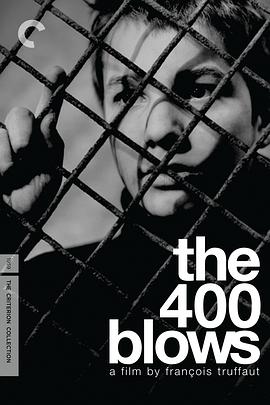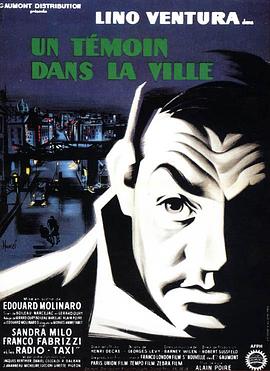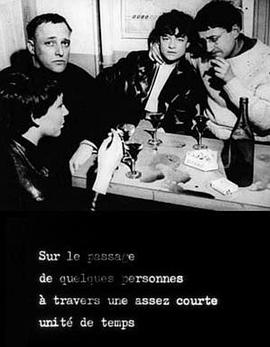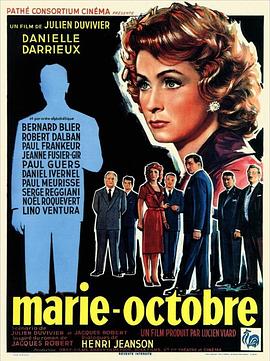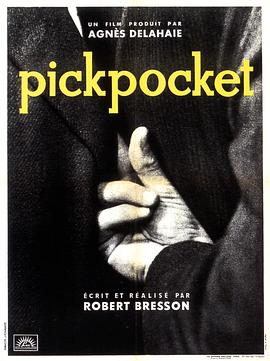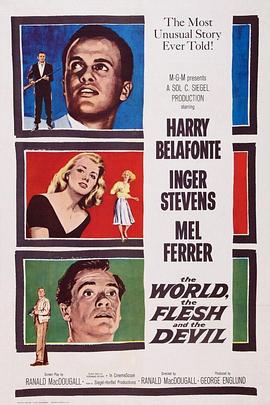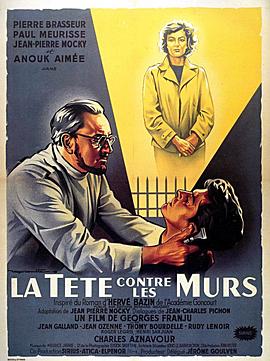剧情片
1959剧情片法国
HD中字
1959剧情片法国
让-皮埃尔·利奥德 克莱尔·莫里耶 阿尔贝·雷米 盖·德孔布勒 乔治·弗拉芒 弗朗索瓦·诺谢 塞尔热·莫阿蒂 Luc Andrieux Christian Brocard 克洛德·芒萨尔 雅克·莫诺 皮埃尔·勒普 亨利·维尔洛热 让-克洛德·布里亚利 让娜·莫罗 菲利普·德·布罗卡 雅克·德米 让·杜歇 让-吕克·戈达尔 Laure Paillette 弗朗索瓦·特吕弗
作文课上,安托万(Jean-Pierre Léaud 饰)在同学传来的女人图像上涂鸦,被罚站墙角。下课后,独守教室的安托万在墙上作诗宣泄自己的不满,引得老师(Guy Decomble 饰)更加愤怒。晚上,母亲(Claire Maurier 饰)因安托万没买面粉大发雷霆, 而继父(Albert Rémy 饰)则在安托万的请求下拿出一笔钱让他吃午饭。 第二天,安托万在同桌勒内(Patrick Auffay 饰)的怂恿下逃了学,跑去看电影打游戏,还在街上看到母亲跟一个安托万不认识的男人亲吻。 第三天,安托万回到学校,慌乱中谎称母亲去世,获得了老师的原谅和疼惜。不想继父获知了他逃学的事,与母亲一起赶到学校,戳穿了他的谎言,还当着全班同学打了他两耳光。 安托万决定留下一封信离家出走。可是小小年纪的他能去哪呢?巴黎那么大,法国那么大,哪里才是他的安身之处呢?
HD中字
1959剧情片法国
Voice 1 (male "professional announcer" type): This neighborhood(1) was made for the wretched dignity of the petty bourgeoisie, for respectable occupations and intellectual tourism. The sedentary population of the upper floors was sheltered from the influences of the street. This neighborhood has remained the same. It was the strange setting of our story, where a systematic questioning of all the diversions and works of a society, a total critique of its idea of happiness, was expressed in acts. These people also scorned "subjective profundity". They were interested in nothing but an adequate and concrete expression of themselves. Voice 2 (Debord, monotone): Human beings are not fully conscious of their real life - usually groping in the dark; overwhelmed by the consequences of their acts; at every moment groups and individuals find themselves confronted with results they have not wished. Voice 1: They said that oblivion was their ruling passion. They wanted to reinvent everything each day; to become the masters and possessors of their own lives. Just as one does not judge a man according to the conception he has of himself, one cannot judge such periods of transition according to their own consciousness; on the contrary, one must explain the consciousness through the contradictions of material life, through the conflict between social conditions and the forces of social production. The progress achieved in the domination of nature was not yet matched by a corresponding liberation of everyday life. Youth passed away among the various controls of resignation. Our camera has captured for you a few aspects of a provisional microsociety. The knowledge of empirical facts remains abstract and superficial as long as it is not concretized by its integration into the whole "” which alone permits the supersession of partial and abstract problems so as to arrive at their concrete essence, and implicitly at their meaning. This group was on the margins of the economy. It tended toward a role of pure consumption, and first of all the free consumption of its time. It thus found itself directly engaged in qualitative variations of everyday life but deprived of any means to intervene in them. The group ranged over a very small area. The same times brought them back to the same places. No one went to bed early. Discussion on the meaning of all this continued... Voice 2: "Our life is a journey "” In the winter and the night. "” We seek our passage..."� Voice 1: The abandoned literature nevertheless exerted a delaying action on new affective formulations. Voice 2: There was the fatigue and the cold of the morning in this much-traversed labyrinth, like an enigma that we had to resolve. It was a looking-glass reality through which we had to discover the potential richness of reality. On the bank of the river evening began once again; and caresses; and the importance of a world without importance. Just as the eyes have a blurred vision of many things and can see only one clearly, so the will can strive only incompletely toward diverse objects and can completely love only one at a time. Voice 3 (young girl): No one counted on the future. It would never be possible to be together later, or anywhere else. There would never be a greater freedom. Voice 1: The refusal of time and of growing old automatically limited encounters in this narrow, contingent zone, where what was lacking was felt as irreparable. The extreme precariousness of the means of getting by without working was at the root of this impatience which made excesses necessary and breaks definitive. Voice 2: One never really contests an organization of existence without contesting all of that organization's forms of language. Voice 1: When freedom is practiced in a closed circle, it fades into a dream, becomes a mere representation of itself. The ambiance of play is by nature unstable. At any moment "ordinary life"� can prevail once again. The geographical limitation of play is even more striking than its temporal limitation. Any game takes place within the contours of its spatial domain. Around the neighborhood, around its fleeting and threatened immobility, stretched a half-known city where people met only by chance, losing their way forever. The girls who found their way there, because they were legally under the control of their families until the age of eighteen, were often recaptured by the defenders of that detestable institution. They were generally confined under the guard of those creatures who among all the bad products of a bad society are the most ugly and repugnant: nuns. What usually makes documentaries so easy to understand is the arbitrary limitation of their subject matter. They describe the atomization of social functions and the isolation of their products. One can, in contrast, envisage the entire complexity of a moment which is not resolved into a work, a moment whose movement indissolubly contains facts and values and whose meaning does not yet appear. The subject matter of the documentary would then be this confused totality. Voice 2: The era had arrived at a level of knowledge and technical means that made possible, and increasingly necessary, a direct construction of all aspects of a liberated affective and practical existence. The appearance of these superior means of action, still unused because of the delays in the project of liquidating the commodity economy, had already condemned aesthetic activity, whose ambitions and powers were both outdated. The decay of art and of all the values of former mores had formed our sociological background. The ruling class's monopoly over the instruments we needed to control in order to realize the collective art of our time had excluded us from a cultural production officially devoted to illustrating and repeating the past. An art film on this generation can only be a film on its absence of real creations. Everyone unthinkingly followed the paths learned once and for all, to their work and their home, to their predictable future. For them duty had already become a habit, and habit a duty. They did not see the deficiency of their city. They thought the deficiency of their life was natural. We wanted to break out of this conditioning, in quest of another use of the urban landscape, in quest of new passions. The atmosphere of a few places gave us intimations of the future powers of an architecture it would be necessary to create to be the support and framework for less mediocre games. We could expect nothing of anything we had not ourselves altered. The urban environment proclaimed the orders and tastes of the ruling society just as violently as the newspapers. It is man who makes the unity of the world, but man has extended himself everywhere. People can see nothing around them that is not their own image; everything speaks to them of themselves. Their very landscape is alive. There were obstacles everywhere. There was a cohesion in the obstacles of all types. They maintained the coherent reign of poverty. Everything being connected, it was necessary to change everything by a unitary struggle, or nothing. It was necessary to link up with the masses, but we were surrounded by sleep. Voice 3: The dictatorship of the proletariat is a desperate struggle, bloody and bloodless, violent and peaceful, military and economic, educational and administrative, against the forces and traditions of the old world. Voice 1: In this country it is once again the men of order who have rebelled. They have reinforced their power. They have been able to aggravate the grotesqueness of the ruling conditions according to their will. They have embellished their system with the funereal ceremonies of the past. Voice 2: Years, like a single instant prolonged to this point, come to an end. Voice 1: What was directly lived reappears frozen in the distance, fit into the tastes and illusions of an era, carried away with it. Voice 2: The appearance of events that we have not made, that others have made against us, now obliges us to be aware of the passage of time, its results, the transformation of our own desires into events. What differentiates the past from the present is precisely its out-of-reach objectivity; there is no more should-be; being is so consumed that it has ceased to exist. The details are already lost in the dust of time. Who was afraid of life, afraid of the night, afraid of being taken, afraid of being kept? Voice 3: What should be abolished continues, and we continue to wear away with it. We are engulfed. We are separated. The years pass and we haven't changed anything. Voice 2: Once again morning in the same streets. Once again the fatigue of so many similarly passed nights. It is a walk that has lasted a long time. Voice 1: Really hard to drink more. Voice 2: Of course one might make a film of it. But even if such a film succeeds in being as fundamentally disconnected and unsatisfying as the reality it deals with, it will never be more than a re-creation "” poor and false like this botched traveling shot. Voice 3: There are now people who pride themselves on being authors of films, as others were authors of novels. They are even more backward than the novelists because they are unaware of the decomposition and exhaustion of individual expression in our time, ignorant of the end of the arts of passivity. They are praised for their sincerity since they dramatize, with more personal depth, the conventions of which their life consists. There is talk of the liberation of the cinema. But what does it matter to us if one more art is liberated through which Tom, Dick or Harry can joyously express their slavish sentiments? The only interesting venture is the liberation of everyday life, not only in the perspectives of history but for us and right away. This entails the withering away of alienated forms of communication. The cinema, too, has to be destroyed. Voice 2: In the final analysis, stars are created by the need we have for them, and not by their talent or lack of talent or even by the film industry or advertising. Miserable need, dismal, anonymous life that would like to expand itself to the dimensions of cinema life. The imaginary life on the screen is the product of this real need. The star is the projection of this need. The images of the advertisements during the intermissions are more suited than any others for evoking an intermission of life. To really describe this era it would no doubt be necessary to show many other things. But what would be the point? Better to grasp the totality of what has been done and what remains to be done than to add more ruins to the old world of the spectacle and of memories. 1. This film, which evokes the lettrist experiences at the origin of the situationist movement, opens with shots of the Paris district frequented by the lettrists in the early 1950s.
HD中字
1959剧情片法国
黑白密室偵探片,十個角色,一女九男,其中一個是兇手。「過去我沒聽說過這戲,為了拍《8美千嬌》,我看了一遍,令我獲益良多,對那年代的美國電影瞭解得更清楚。」(奧桑)《Marie-Octobre》很寫實,是齣沉重的電影,拍得一板一眼。奧桑往相反方向走 - 輕鬆、非寫實、七彩、諷刺(人物互相指控而來)。 同類克里斯蒂式偵探片,奧桑較喜歡佳咸美頓(Guy Hamilton:《破鏡奇案》(The Mirror Crack'd),《午日奇屍》(Evil under the Sun),還有Sydney Lumet的《東方快車》。《8美千嬌》參照此片最多的是佈景設計,像客廳、書房、睡房、飯廳等。
HD中字
1959剧情片法国
马丁·拉萨尔 玛莉卡·格林 Jean Pélégri Dolly Scal Pierre Leymarie Kassagi 皮埃尔·埃泰 César Gattegno Sophie Saint-Just 多米尼克·扎尔迪
影片以日记的形式呈现。无所事事的年轻人米歇尔(马丁·拉萨尔 Martin LaSalle 饰)在赛马场目睹了一个小偷偷窃的全过程,他被小偷那自信优雅的手法所吸引遂即加入了偷窃的勾当。爱读书,坚持虚无主义哲学思想的米歇尔坚信偷窃是一种手指的芭蕾,一场完美的行窃就像一场精彩的行为艺术。米歇尔有一个久违的病重的母亲,在去探望的时候结识了一直照顾他母亲的邻居珍妮(玛莉卡·格林 Marika Green 饰),漂亮的珍妮唤醒了米歇尔心中沉睡已久的感情。米歇尔被警察盯住了,警长虽然三番五次的给了他改过自新的机会,但米歇尔依旧沉迷于他的“艺术”中无法自拔,很快,米歇尔被捕了。 珍妮来狱中探望米歇尔,她向他袒露了自己的真情,米歇尔在泪水中猛然醒悟,当生命中还有所爱的人存在,生活就不会是一片虚无。
HD中字
1959剧情片美国
Ralph Burton is a miner who is trapped for several days as a result of a cave-in. When he finally manages to dig himself out, he realizes that all of mankind seems to have been destroyed in a nuclear holocaust. He travels to New York City only to find it deserted. Making a life for himself there, he is flabbergasted to eventually find Sarah Crandall, who also managed to survive. Together, they form a close friendship until the arrival of Benson Thacker who has managed to pilot his small boat into the city's harbor. At this point the tensions rise between the three, particularly between Thacker, who is white and Burton, who is black.
HD中字
1959剧情片法国
François Gérane alterne internements et incarcérations, entrecoupés de quelques escapades furtives. Asile, puis prison, puis asile, asile et asile encore - ou, Hôpital psychiatrique, comme on veut bien aimablement le nommer désormais dans les années 1930. Des enfermements en acte donc, mais aussi psychologiques. Le héros a beau fuir à travers champs, il demeure captif de lui-même : « Les murs sont avant tout tes murs. Ils peuvent reculer devant tes pas, mais ta liberté même reste une enceinte si tu ne sors pas de toi-même », lui souffle la bouche rouillée des serrures de sa chambre de détention. La Tête contre les murs n'est autre que la banale histoire d'un infirme de la liberté.
HD中字


